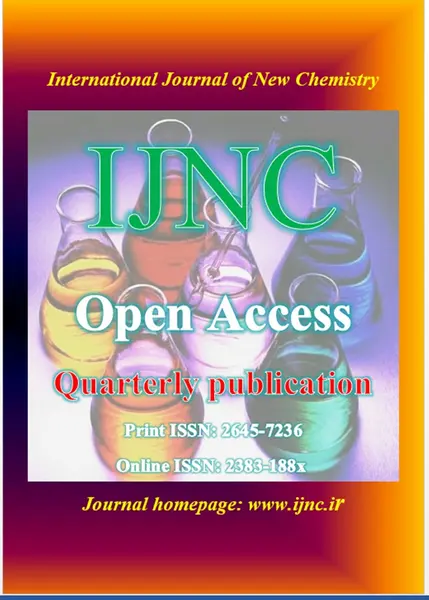-
an empirical technique for prediction of nucleation mechanism and interfacial tension of potassium chloride nanoparticles
جزئیات بیشتر مقاله- تاریخ ارائه: 1400/11/09
- تاریخ انتشار در تی پی بین: 1400/11/09
- تعداد بازدید: 128
- تعداد پرسش و پاسخ ها: 0
- شماره تماس ژورنال: 09122976055
an empirical technique for prediction of nucleation mechanism and interfacial tension of potassium chloride nanoparticles
prediction of the nucleation mechanism is one of the most critical factors in the design of a crystallization system. information about the nucleation mechanism helps to control the size, shape, size distribution, and purity of the produced crystals. when the crystallization method is used for producing nanoparticles, the nucleation mechanism should be predicted. in this study, an empirical correlation based on the induction time, classical nucleation theory, and kashchive model is used to determine the nucleation mechanism. nanoparticles are produced in the presence of cetyl trimethyl ammonium bromide (ctab) and the effect of ctab on the induction time and the interfacial tensions of potassium chloride nanoparticles have been investigated. the obtained results demonstrated that the nucleation mechanism of potassium chloride nanoparticles is heterogeneous. this method is simple and can be applied at ambient conditions for synthesis other mineral nanoparticles. it can also be applied to study the induction time with high accuracy.
حوزه های تحت پوشش ژورنال
مقالات جدیدترین رویدادها
-
استفاده از تحلیل اهمیت-عملکرد در ارائه الگوی مدیریت خلاقیت سازمانی و ارائه راهکار جهت بهبود
-
بررسی تاثیر ارزش وجوه نقد مازاد بر ساختار سرمایه شرکت های پذیرفته شده در بورس اوراق بهادار تهران
-
بررسی تأثیر سطح افشای ریسک بر قرارداد بدهی شرکت های پذیرفته شده در بورس اوراق بهادار تهران
-
بررسی تأثیر رتبه بندی اعتباری مبتنی بر مدل امتیاز بازار نوظهور بر نقد شوندگی سهام با تأکید بر خصوصی سازی شرکت ها
-
تأثیر آمیخته بازاریابی پوشاک ایرانی بر تصویر ذهنی مشتری پوشاک ایرانی (هاکوپیان)
-
بررسی پتانسیل هیدروکربوری و محیط رسوبی سازند آب تلخ در برش الگو براساس پیرولیز راک – ایول و پالینومورفها
-
سنجش وفاداری مشتریان در فروشگاه های اینترنتی (مورد مطالعه فروشگاه اینترنتی بازار اینترنتی ایرانیان)
-
استفاده از bacillus lentus و pseudomonas putida به عنوان پروبیوتیک در جوجه های گوشتی
-
weighted pseudo almost periodic solutions of second order neutral differential equations with piecewise constant argument
-
inhibitive effect of benzotriazole on the stress corrosion cracking of copper-based alloy (brass) in ammonia solutions
مقالات جدیدترین ژورنال ها
-
مدیریت و بررسی افسردگی دانش آموزان دختر مقطع متوسطه دوم در دروان کرونا در شهرستان دزفول
-
مدیریت و بررسی خرد سیاسی در اندیشه ی فردوسی در ادب ایران
-
واکاوی و مدیریت توصیفی قلمدان(جاکلیدی)ضریح در موزه آستان قدس رضوی
-
بررسی تاثیر خلاقیت، دانش و انگیزه کارکنان بر پیشنهادات نوآورانه کارکنان ( مورد مطالعه: هتل های 3 و 4 ستاره استان کرمان)
-
بررسی تاثیر کیفیت سیستم های اطلاعاتی بر تصمیم گیری موفق در شرکتهای تولیدی استان اصفهان (مورد مطالعه: مدیران شرکتهای تولیدی استان اصفهان)
-
بررسی عملکرد و سایه اندازی شناشیر و کاربرد آن در شکل گیری معماری جنوب ایران با نمونه موردی بوشهر
-
بررسی رابطه استرس حسابرس، کیفیت حسابرسی و کیفیت اطلاعات در شرکت های پذیرفته شده در بورس اوراق بهادار تهران
-
ارائه الگوی انتخاب تامین کننده سبز با رویکرد تلفیق تکنیک های تصمیم گیری چندشاخصه
-
عناصر معماری پایدار در باغ سیف الدوله شهرستان ملایر
-
مروری بر کاربرد الگوریتم های یادگیری ماشین در پیش بینی عملکرد انرژی ساختمان


سوال خود را در مورد این مقاله مطرح نمایید :